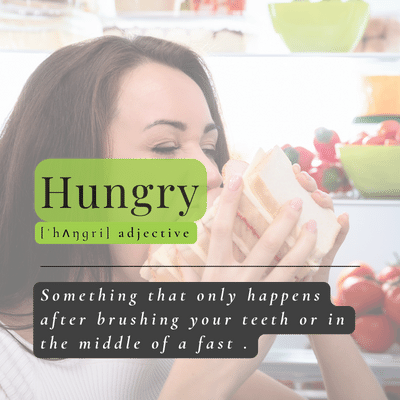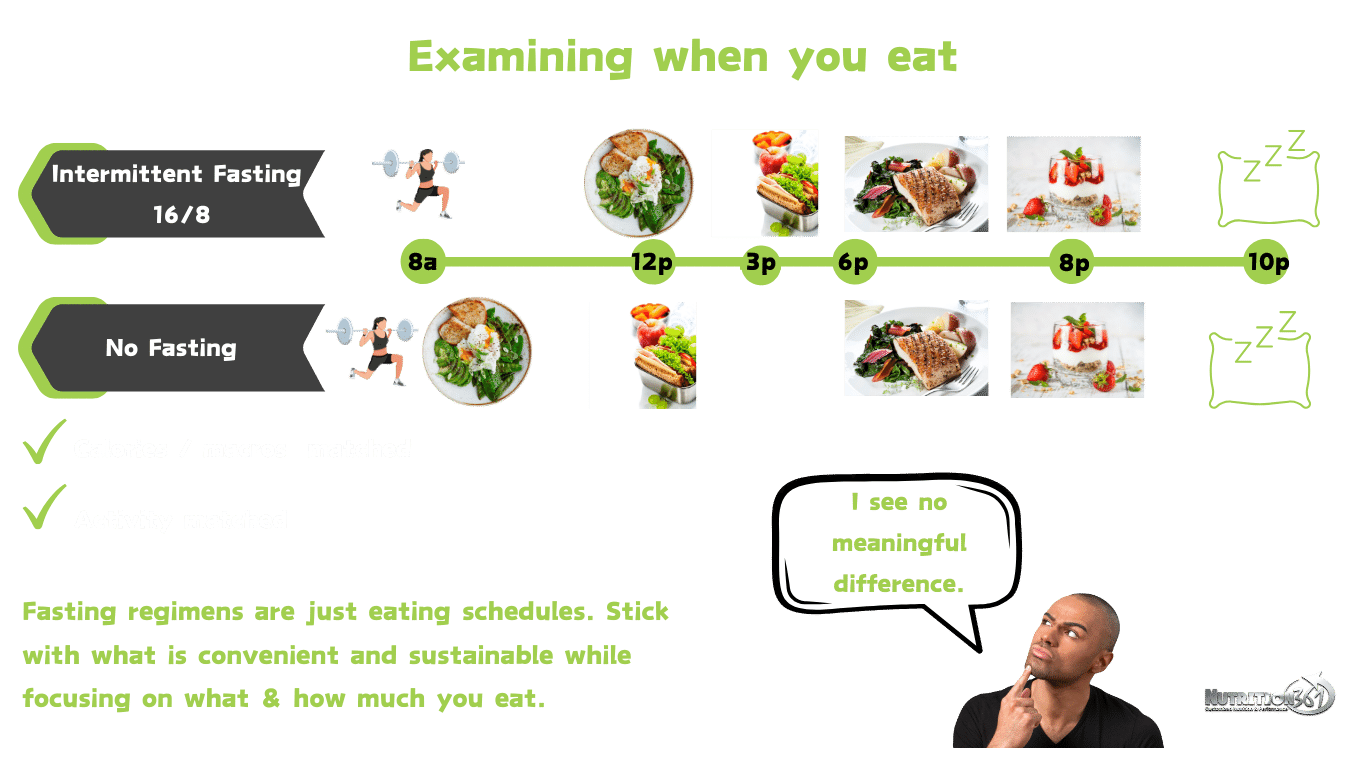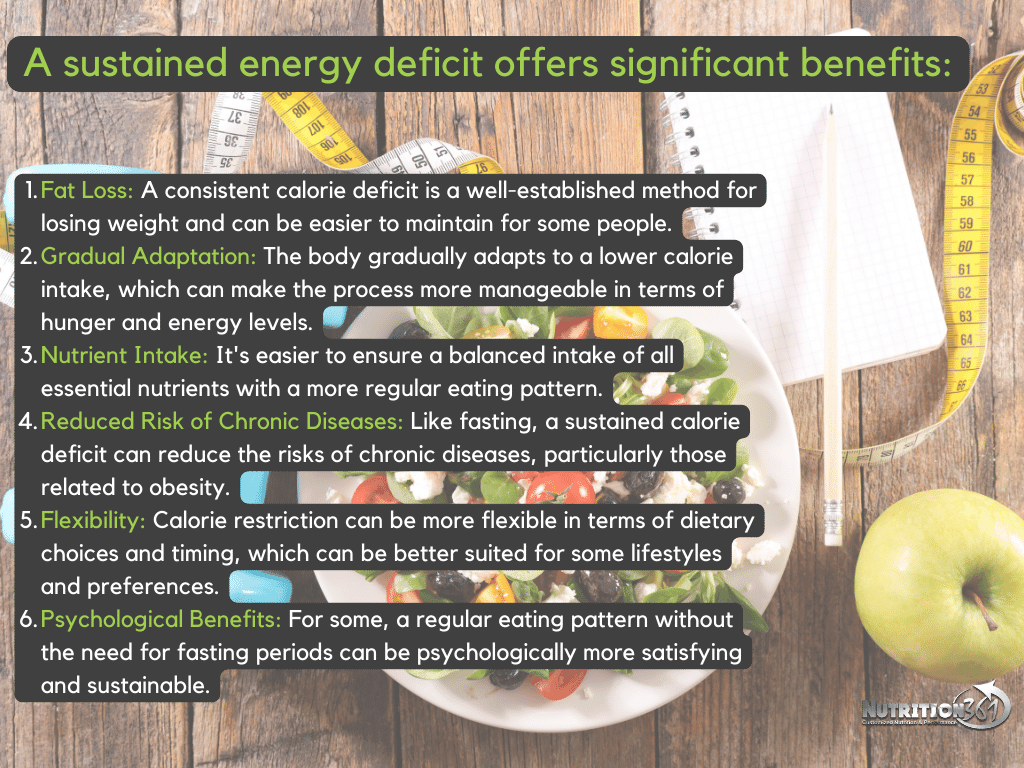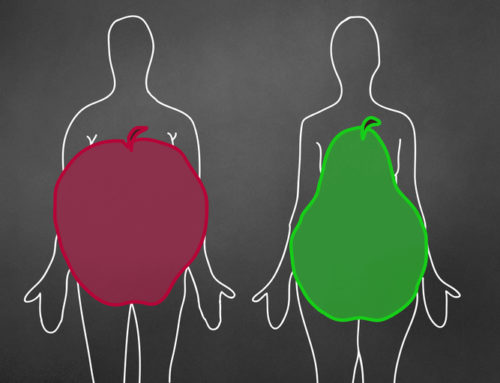Fasting and it’s various iterations have become very popular. In the constant search for the best way to eat / diet for overall health, weight loss, longevity, building muscle, etc. fasting has taken it’s place in the zeitgeist.
Given my background, I get questions about fasting and how to do it, how to curb your appetite, etc. One question I don’t get as much as you’d think is, should I fast?
Most individuals who approach me are already convinced of fasting’s benefits, having been influenced by popular media figures. They often seek clarification or confirmation of their beliefs. In this article, I’ll delve into not only the specifics of managing hunger during fasting, but also touch upon the broader question of whether fasting is suitable for everyone.
Below is a table of contents so you can click and skip around the article if you’d like.

Defining Different Methods of Fasting
Fasting, involves abstaining from all or some kinds of food intake or drink, can be categorized into several types, each with its own unique characteristics and methods that vary based on fasting time.
- Intermittent Fasting (IF): This involves alternating cycles of eating and fasting. Common approaches include:
-
- 16/8 Method: 16 hours of fasting period per day and eating during an 8-hour eating window.
- 5:2 Diet: Eating normally for 5 days of the week and restricting calorie intake to 500–600 calories on the other 2 days.
- Eat-Stop-Eat: Involves a 24-hour fasting window once or twice a week.
- Alternate-Day Fasting (ADF): This involves alternating days with no food restriction with days that consist of one meal that provides about 25% of daily calorie needs.
- Periodic Fasting or Whole-Day Fasting: This involves fasting for entire days. For example, fasting for two days a week or every other day. It’s more extended than the fasts in intermittent fasting.
- Water Fasting: Abstaining from all food and drink except water for a set period of time. This can last anywhere from 24 hours to several days.
- Dry Fasting: This is an extreme form of fasting where one refrains from both food and water. It’s usually done for shorter periods and is not commonly recommended for health purposes.
- Religious Fasting: Many people incorporate fasting for religious reasons, and these fasts vary widely in their rules. Examples include Ramadan in Islam, Yom Kippur in Judaism, and Lent in Christianity.
- Juice Fasting: Consuming only fruit and vegetable juices for nutrition while abstaining from solid food. This is typically done for detoxification purposes.
- Partial Fasting: Involving abstaining from certain foods or drinks. For example, giving up processed foods, animal products, or caffeine.
Each type of fasting can have different effects on the body and should be chosen based on individual health status, goals, and lifestyle. It’s important to consult with a healthcare provider before starting any fasting regimen, especially for individuals with health conditions.
Many of the above fasting regimens call for no calories during the fasting windows. Therefore, consuming calorie free drinks will not break the fast. Examples include, black tea, herbal tea, green tea, black coffee, diet sodas, etc.
For most regimens, it says nothing about what or how much you are eating which are more important. The way I simplify fasting for people is that it is simply an eating schedule. Therefore, it can be used for weight loss, weight gain (rarely), a low-carb diet / keto diet, high protein, plant based etc.
Decoding Hunger Mechanisms
Before we dive into strategies for food cravings and hunger pains, let’s look under the hood to discuss what drives real hunger. Hunger is controlled by a complex interplay of various physiological mechanisms involving the brain, hormones, and the digestive system. Here’s an overview:
Role of the Brain: The hypothalamus, a region in the brain, plays a central role in regulating hunger. It responds to various signals that indicate the body’s energy needs.
Hormonal Signals:
-
- Ghrelin: Often called the “hunger hormone,” ghrelin is produced in the stomach and signals the brain to increase appetite. Its levels increase before meals and decrease after eating.
- Leptin: Produced by fat cells, leptin signals the hypothalamus that the body has sufficient energy stores, thus reducing appetite.
- Insulin: Released by the pancreas, insulin regulates blood sugar levels and signals the brain about the current state of the body’s energy reserves.
- Pro tip: Resistance training has repeatedly demonstrated as effective for increased glycemic control and significantly lowers HbA1c in type 2 diabetics.
Blood Sugar Levels: Fluctuations in blood sugar levels can influence hunger levels. A drop in blood sugar stimulates appetite, while an increase can lead to a feeling of satiety.
Digestive Tract: The stomach and intestines send signals to the brain based on their fullness. Stretch receptors in the stomach activate when it’s full, sending signals to the brain to reduce hunger.
Nutrient Signals: The brain also receives signals about the nutrient content of the food consumed. This can affect the duration until the next hunger signal.
Psychological Factors: Psychological and environmental cues, such as sight and smell of food, can also trigger hunger, even in the absence of physiological hunger.
Other Hormones and Factors: Other hormones like cortisol (stress hormone) and environmental factors like temperature can also influence hunger.

Hunger headaches can occur for various reasons including dehydration, too much or too little caffeine from what you are accustomed to, lack of sleep, etc. However, when fasting they are typically caused by low blood sugar levels. If you are prone to these, fasting may not be the best eating schedule for you.
These mechanisms work together to maintain energy balance in the body. Hunger signals prompt eating to replenish energy stores, while satiety signals help prevent overeating. The balance between these signals can be affected by various factors, including lifestyle, diet, and medical conditions. To lose weight, one needs a sustained energy deficit so some hunger is inevitable, however a manageable amount is necessary for the deficit to be sustained.
Effective Strategies to Curb Hunger Pangs
The question is which of the mechanisms above are most in our control. Some of them are simply going to rise or fall from being in a fasted state, for example ghrelin and blood sugar levels respectively. That stated, there’s a truism regarding nutrient density and satiety (fullness). Nutrient-dense foods are generally less processed and yield greater satiety.
With the above tips, be sure to avoid the if is some is good more is better fallacy. For instance, with hydration. Consuming say 1 gallon of water (includes all liquids, fruit, vegetables, etc.) may be sufficient and doubling does not double the effectiveness and can lead to hyponatremia.
Evaluating the Benefits of Fasting
If you have surfed social media, you’ve no doubt encountered various claims about fasting, which I’ll review below. One rant I have is when people post before after pictures from a long fast, such as 4 days and say look how lean I look in the after. Well, you didn’t eat anything for 4 days, of course you look leaner!
Examining the claims:
Hormonal and Metabolic Changes: Fasting triggers hormonal changes, like increased norepinephrine and reduced insulin levels, which can enhance fat burning and metabolic rate.
Verdict: This is triggered by a calorie deficit, therefore the cause is the energy deficit rather than fasting. Note exercise also increases norepinephrine (and consequently fat burning and metabolic rate) and increases insulin sensitivity.
Autophagy: This is a process where cells remove toxins and repair themselves. It’s believed to play a role in preventing diseases like cancer and Alzheimer’s.
Verdict: Aside from rodent research, the evidence in humans does not demonstrate that intermittent fasting (or other fasting regimens) helps increase autophagy any more than exercise and calorie restriction.
Improved Insulin Sensitivity: Fasting can improve insulin sensitivity, potentially reducing the risk of type 2 diabetes.
Verdict: As noted above, exercise and continuous energy restriction increases insulin sensitivity.
Cardiovascular Health: Some studies suggest fasting can improve heart health by influencing blood lipids, blood pressure, and metabolic risk factors.
Verdict: You may notice a theme here, but this is also true for a sustained energy deficit leading to fat loss. If a fasting schedule helps you achieve this that works, just understand the underlying cause.
Mental Clarity and Neurological Benefits: Some people report improved focus and cognitive function during fasting periods. It may also have neuroprotective effects.
Verdict: The feeling of mental clarity is an anecdotal claim and one that I would not dismiss as I’ve heard many people say this. I find that exercise does this as well. If one has found fasting to help them mentally, that’s definitely a positive. My working theory be it intense exercise or fasting is that difficult things, struggle if you will makes us feel good as you get a sense of accomplishment.
Convenience: Fasting simplifies meal planning and can reduce the time spent on thinking about food.
Verdict: This 100% will vary from person to person. For some it’s convenient and for others they are staring at the clock waiting to eat. If you fall in the latter category, I’d not be too rigid with meal timing and focus on what and how much you are eating.

Comparing Fasting Benefits to a Calorie Deficit
The health and fitness world does not lack in claims about longevity, optimal health, fat loss, etc. and fasting is the method du jour. The real question is which claims are true and is pursuing fasting necessary and worthwhile.
Also, is the specific behavior responsible for the outcome or is it something else? Much of the research touted for specific health benefits (fat loss, autophagy, etc.) to fasting lack a daily energy restriction group as a comparison to determine if the beneficial effects of fasting are due to the net energy deficit or the eating schedule (fasting).
Let’s review a well designed study comparing alternate day fasting (ADF) and continuous energy restriction.
- 36 adults (15 men / 21 women)
- 42 years old +/- 11 years
- Body fat average 24% +/- 7.7%
- Duration: 3 weeks
The study had 3 groups:
Group 1 (linear deficit) Consumed 75% of their normal calorie intake every day for 3 weeks.
Group 2 (ADF matched deficit to group 1) Alternated between a 24 hour fast and consuming 150% of their normal calorie intake for 3 weeks.
Group 3 (ADF group energy balance) alternated between a 24 hour fast and consuming 200% of their normal calorie intake for 3 weeks.
Note the fasted groups (group 2 & 3) were instructed to only consume water, tea, or black coffee on fasting days.
Measurements: Activity was monitored with wearable devices and body composition was assessed before and after via DXA scan. Blood work and fat tissue biopsies (used to assess gene expression) were also taken before and after the study.
Results:
| Results | Group 1 (linear deficit) | Group 2 (ADF deficit) | Group 3 (ADF energy balance) |
|---|---|---|---|
| Average Fat Loss/Gain | -1.75 kg (-3.85 lb.) | -0.74 kg (-1.63 lb.) | -0.12 kg (-0.26 lb.) |
| Average Lean Body Mass Loss/Gain | -0.03 kg (-.07 lb.) | -0.74 kg (-1.63 lb.) | -0.52 kg (-1.14 lb.) |
| Average change in energy expenditure from physical activity | +1.4 kcal/d | -97.8 kcal/d | +58.5 kcal/d |
Conclusion: In examining the efficacy of fasting versus a sustained calorie deficit, this study suggests that for fat loss and lean mass maintenance, a continuous energy deficit may be more beneficial than alternate-day fasting.
For those engaged in resistance training or athletic activities, take note of these results as I tell those from these populations asking about alternate day fasting, you don’t build or maintain muscle by not eating. A better case for preserving lean body mass can be made for intermittent fasting.


